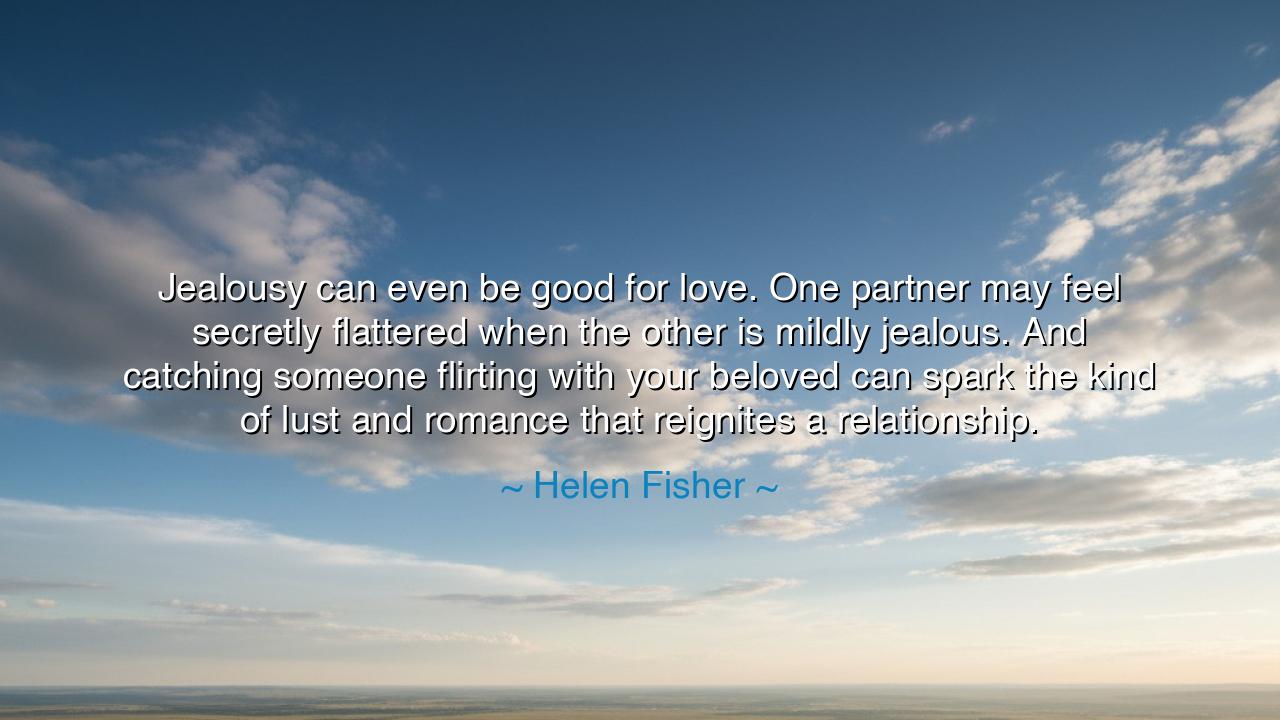
Jealousy can even be good for love. One partner may feel secretly
Jealousy can even be good for love. One partner may feel secretly flattered when the other is mildly jealous. And catching someone flirting with your beloved can spark the kind of lust and romance that reignites a relationship.






There is bold insight and delicate balance in the words of Helen Fisher, when she said: “Jealousy can even be good for love. One partner may feel secretly flattered when the other is mildly jealous. And catching someone flirting with your beloved can spark the kind of lust and romance that reignites a relationship.” In this thought, Fisher — a renowned anthropologist and scholar of human emotion — unveils one of the paradoxes of the heart: that jealousy, long condemned as destructive and poisonous, can also, in its gentlest form, revive passion and remind lovers of what they cherish most. Like fire, jealousy can warm or destroy. Used wisely, it rekindles desire; unchecked, it consumes all in its path.
Helen Fisher, who has spent decades studying the chemistry of love and attachment, speaks not as a moralist, but as a scientist of the soul. She understands that human emotion is not easily divided into good and evil, for every feeling serves a purpose in the great design of nature. Jealousy, she reminds us, is not born from wickedness but from longing — a deep, instinctive desire to protect one’s bond. It is the whisper of the heart that fears losing what it values most. When held in balance, it can stir lovers to appreciation, reminding them that love is not possession, but privilege. When it burns too fiercely, it blinds and wounds. Thus, the wisdom of Fisher’s words lies in her recognition that emotion must be mastered, not denied.
To understand her meaning, we must look to the ancient roots of love itself. In every culture, stories have been told of the double-edged nature of passion — how love and jealousy dance together like flame and shadow. Consider the tale of Antony and Cleopatra, whose love was as tempestuous as it was legendary. When Cleopatra feigned her death to test Antony’s devotion, his jealousy and despair drove him to take his own life. Their tragedy reveals the danger of unbridled jealousy, yet also its power — for jealousy, in that moment, proved the depth of his love. It was both his downfall and his declaration. From such tales we learn that jealousy, though perilous, is inseparable from the intensity of love itself.
But Helen Fisher’s insight lies in transformation, not tragedy. She sees that mild jealousy — the kind that stirs, not scorches — can reawaken attention and affection. In the quiet routines of long relationships, where comfort may dull desire, the sight of a beloved being admired by another can remind one of what was once pursued with passion. This feeling, when handled with trust, can lead not to resentment, but renewal. The lover feels again the pulse of early love — the excitement, the tenderness, the awe of realizing that their partner is still desired, still alive with beauty. It is not possession that ignites this spark, but recognition. Love, when reminded of its fragility, begins to bloom again.
In this way, Fisher echoes a truth the ancients knew well: that the human heart thrives on contrast. Without absence, we do not appreciate presence; without risk, we forget the worth of what we hold. The mild sting of jealousy can awaken gratitude — it reminds us that love is not guaranteed, and that each moment of intimacy is something to be tended, not taken for granted. When partners feel this awareness together, their bond deepens; the old passion finds new life. Thus, jealousy, when tempered by wisdom and kindness, becomes not a threat but a teacher — revealing both the depth of one’s attachment and the humility required to sustain it.
Yet, one must tread carefully, for the same spark that kindles warmth can set fire to the house. Helen Fisher warns through implication that jealousy must never become obsession. The wise lover distinguishes between protective instinct and possessive control. To be “mildly jealous” is to feel the tremor of vulnerability, not the storm of domination. When jealousy becomes a weapon, love turns to fear. When it becomes a mirror, love turns to growth. Therefore, the art of love is not to extinguish jealousy, but to refine it into awareness — to let it remind, not consume.
Let this be the teaching for all who love: do not despise your moments of jealousy, but study them. Ask what they reveal — not about your partner, but about yourself. Does your jealousy arise from love or from insecurity? From devotion or from fear? Use it as a compass, not a chain. Let it direct you back to appreciation, to communication, to tenderness. For love that is never challenged grows complacent, and love that is never tested forgets its worth.
Thus, Helen Fisher’s words become both a revelation and a caution: jealousy is neither wholly evil nor wholly good — it is the shadow of love’s light, and how it moves depends on the wisdom of the heart that casts it. If we master it, it sharpens our desire and renews our joy. If we surrender to it, it destroys what it sought to protect. The wise, therefore, cherish the lesson — that love, like all great forces of nature, must be held with reverence, guided with patience, and never taken for granted.






AAdministratorAdministrator
Welcome, honored guests. Please leave a comment, we will respond soon